|
|
|
Sort Order |
|
|
|
Items / Page
|
|
|
|
|
|
|
| Srl | Item |
| 1 |
ID:
187528
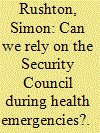

|
|
|
|
|
| Summary/Abstract |
In passing resolutions on HIV/AIDS, Ebola and COVID-19, the Security Council has shown at least a passing interest in health, and calls have been made to give it a more central role in global disease response. In this contribution, reflecting on two decades of the UNSC’s engagement with health emergencies, I suggest we should be cautious about making the Security Council too central to pandemic response. I focus on three problems with the Council: that it is highly politicised and deeply divided in ways that mean it cannot be relied on to act when needed most; that when it does act it tends to do so too late, once an emerging problem has already become a global crisis; and that it does not in any case necessarily have the tools at its disposal to make a meaningful contribution. Instead, I argue, it is precisely its role as a ‘health outsider’ that enables the UNSC to occasionally make a contribution. It would be risky indeed to hand such a body real responsibility for crisis response. That is a task much more likely to be performed assiduously (if often imperfectly) by a body such as the WHO.
|
|
|
|
|
|
|
|
|
|
|
|
|
|
|
|
| 2 |
ID:
169259
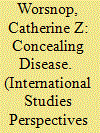

|
|
|
|
|
| Summary/Abstract |
Slow outbreak reporting by states is a key challenge to effectively responding to global health emergencies like Zika, Ebola, and H1N1. Current policy focuses on improving domestic outbreak surveillance capacity globally in order to reduce reporting lags. However, governments also face economic and political incentives to conceal outbreaks, and these incentives largely are ignored in policy discussions. In spite of the policy implications for outbreak response, the “capacity” and “will” explanations have not been systematically examined. Analysis of a dataset coding the timeliness of outbreak reporting from 1996–2014 finds evidence that states’ unwillingness to report—rather than just their inability—leads to delayed reporting. The findings suggest that though building surveillance capacity is critical, doing so may not be sufficient to reduce reporting lags. Policy aimed at encouraging rapid reporting must also mitigate the associated economic and political costs.
|
|
|
|
|
|
|
|
|
|
|
|
|
|
|
|
| 3 |
ID:
185658


|
|
|
|
|
| Summary/Abstract |
Like other African nations, Sierra Leone seemed to avoid the worst pandemic scenarios. Its previous experience with Ebola may have led to improved preparedness in the health system. But the government has once again reverted to a militarized response, and elites returning from international travel may pose a risk of spreading the coronavirus. The author also reflects on the challenges of tracking the situation from afar, in the midst of a global crisis, and critically assesses Western media coverage of African public health issues.
|
|
|
|
|
|
|
|
|
|
|
|
|
|
|
|
| 4 |
ID:
144241
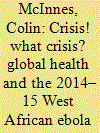

|
|
|
|
|
| Summary/Abstract |
This article examines why the 2014–15 outbreak of Ebola in West Africa, which subsequently spread more widely, was understood as a crisis. It begins from the basis that there was nothing ‘natural’ about it being considered a crisis; rather it was socially constructed as such. Specifically it suggests that the outbreak could be understood as a crisis because of the way in which it resonated with the global health narrative. The article examines how the elements which constitute this narrative – the effects of globalisation, the emergence of new risks and the requirement for new political responses – are fundamental to how Ebola was understood as a crisis.
|
|
|
|
|
|
|
|
|
|
|
|
|
|
|
|
| 5 |
ID:
144240
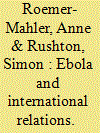

|
|
|
|
|
| Summary/Abstract |
The outbreak of Ebola Virus Disease (EVD) that gripped Liberia, Guinea and Sierra Leone through much of 2014 and 2015 was an enormous and in many ways unprecedented health emergency. Yet the outbreak was not only a global health event – it was also a global political event. In this introduction to the special issue we discuss the contribution that International Relations scholarship can make to analysing and understanding the Ebola outbreak and the global response to it. We group our comments around four key themes: (1) allocating responsibility in a diffuse global health governance system; (2) the causes and effects of Ebola being perceived as a global crisis; (3) the downsides of a security-driven approach to global health emergencies; and (4) issues of inequality both between and within countries, including those around gender, resources and power.
|
|
|
|
|
|
|
|
|
|
|
|
|
|
|
|
| 6 |
ID:
144250
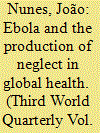

|
|
|
|
|
| Summary/Abstract |
This article argues that the 2014 Ebola outbreak in West Africa reinscribed the neglect that has surrounded this disease. The argument develops theoretical tools for understanding how neglect is produced in global health. Arguing that neglect is connected with the production of harm and vulnerability, it stresses the importance of emotions in issue-prioritisation in global health. Focusing on the dynamics of abjection, the article shows how the 2014 Ebola outbreak was framed as a (racialised) African problem and obfuscated by a political and media spectacle. The result was the preference for short-term crisis-management responses that detracted from long-term structural solutions.
|
|
|
|
|
|
|
|
|
|
|
|
|
|
|
|
| 7 |
ID:
144245
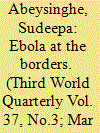

|
|
|
|
|
| Summary/Abstract |
As well as a site of politics and public health action, the outbreak of Ebola in West Africa has been a focus of media representations. This paper examines print media narratives around border control in relation to Ebola in the UK, the USA and Australia from the start of the epidemic to May 2015. It shows that Ebola became mobilised as a frame through which domestic politics could be discussed. The disease was transformed from a problem for West Africa to a problem for the West. The context of West Africa and affected populations was homogenised and hidden. The focus of reporting centred upon domestic political actions and more local sources of threat.
|
|
|
|
|
|
|
|
|
|
|
|
|
|
|
|
| 8 |
ID:
144244
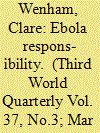

|
|
|
|
|
| Summary/Abstract |
Combating threats of infectious diseases has been increasingly framed as a global shared responsibility for a multi-actor framework of states, international organisations and nongovernmental actors. However, the outbreak of Ebola Virus Disease (EVD) has shown that this governance framework has not been able to limit the spread of this virus, despite the normative and legislative changes to global disease control. By unbundling the concept of responsibility, this article will assess how global shared responsibility may have failed because accountability does not fall on any one state or stakeholder, highlighting an inherent weakness in the global disease governance regime. The paper concludes that a move towards multiple responsibilities may prove a more effective mechanism for ensuring global health security.
|
|
|
|
|
|
|
|
|
|
|
|
|
|
|
|
| 9 |
ID:
152720
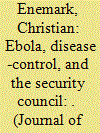

|
|
|
|
|
| Summary/Abstract |
In 2014, the United Nations Security Council (UNSC) described the Ebola outbreak then ongoing in West Africa as “a threat to international peace and security.” Resolution 2177 was the first time a disease outbreak of natural origin had been described using language ordinarily applied to political violence. This article assesses the significance of Resolution 2177 as an instrument of health governance, with particular regard to the Council’s primary aim: to bring about the lifting of state-imposed bans on travel to and from West Africa. The UNSC’s response might at first appear to have been an international-level attempt to remove Ebola from the realm of security policy for the sake of public health. However, the use of threat language in Resolution 2177, alongside the rapid mobilization of disease-control resources by some governments represented on the Council, suggests that some kind of security logic was driving the international response to Ebola. I posit that it was not the logic of securitization, based upon the use of borders as barriers to contagion, that drove UN policy. Rather, the UNSC appears to have acted according to the security logic of governmentality, whereby the health of populations (within and beyond West Africa) would be secured by facilitating cross-border circulation of medical professionals. The Council’s contribution to health governance was to support a shift in security logic: from securitization to securing circulation.
|
|
|
|
|
|
|
|
|
|
|
|
|
|
|
|
| 10 |
ID:
144249
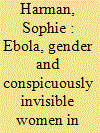

|
|
|
|
|
| Summary/Abstract |
The international response to Ebola brings into stark contention the conspicuous invisibility of women and gender in global health governance. Developing feminist research on gender blindness, care and male bias, this article uses Ebola as a case to explore how global health rests on the conspicuous free labour of women in formal and informal care roles, yet renders women invisible in policy and practice. The article does so by demonstrating the conspicuous invisibility of women and gender in narratives on Ebola, emergency and long-term strategies to contain the disease, and in the health system strengthening plans of the World Health Organization and World Bank.
|
|
|
|
|
|
|
|
|
|
|
|
|
|
|
|
| 11 |
ID:
137759
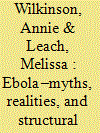

|
|
|
|
|
| Summary/Abstract |
TEN MONTHS AFTER THE FIRST INFECTION, Margaret Chan, Director-General of the World Health Organization, described the Ebola epidemic in West Africa as the ‘most severe acute public health emergency in modern times’. The disaster, she said, represents a ‘crisis for international peace and security’ and threatens the ‘very survival of societies and governments in already very poor countries’.1 As of October 2014, the disease had killed 4,951 and infected 13,567.2 It has crippled families, health systems, livelihoods, food supplies and economies in its wake. These numbers are likely to be vastly underestimated. How did it get to this? Why has this outbreak been so much larger than previous ones? The scale of the disaster has been attributed to the weak health systems of affected countries, their lack of resources, the mobility of communities and their inexperience in dealing with Ebola.3 This answer, however, is woefully de-contextualized and de-politicized. This briefing examines responses to the outbreak and offers a different set of explanations, rooted in the history of the region and the political economy of global health and development.
|
|
|
|
|
|
|
|
|
|
|
|
|
|
|
|
| 12 |
ID:
140558
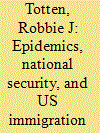

|
|
|
|
|
| Summary/Abstract |
What are relationships between epidemics, national security, and US immigration policy? This question is important because it sheds light on transnational or nontraditional security areas, American immigration policy, and a pressing issue for US leaders who have recently faced epidemics such as the West Africa Ebola outbreak that began in 2013. This article answers it and lays ground in the area by reviewing epidemics in world history, using International Relations and Security Studies works to specify dangers of contagions for states, and identifying three general immigration measures that American leaders have utilized from the seventeenth century to the present day to protect against contagions, which are (1) policies restricting entrance of foreigners thought to carry specified diseases, (2) the isolation or quarantining of immigrants with contagious disease, and (3) delegating the President with authority to stop immigration in the event of an epidemic abroad. This study has implications for research and contemporary US immigration policy.
|
|
|
|
|
|
|
|
|
|
|
|
|
|
|
|
| 13 |
ID:
148453


|
|
|
|
|
| Summary/Abstract |
Globally gender remains a key factor in differing health outcomes for men and women. This article analyses the particular relevance of gender for debates about global health and the role for international human rights law in supporting improved health outcomes during public health emergencies. Looking specifically at the recent Ebola and Zika outbreaks, what we find particularly troubling in both cases is the paucity of engagement with human rights language and the diverse backgrounds of women in these locations of crisis, when women-specific advice was being issued. We find the lessons that should have been learnt from the Ebola experience have not been applied in the Zika outbreak and there remains a disconnect between the international public health advice being issued and the experience of pervasive structural gender inequalities among those experiencing the crises. In both cases we find that responses at the outbreak of the crisis presume that women have economic, social or regulatory options to exercise the autonomy contained in international advice. The problem in the case of both Ebola and Zika has been that leaving structural gender inequalities out of the crisis response has further compounded those inequalities. The article argues for a contextual human rights analysis that takes into account gender as a social and economic determinant of health.
|
|
|
|
|
|
|
|
|
|
|
|
|
|
|
|
| 14 |
ID:
163176
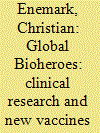

|
|
|
|
|
| Summary/Abstract |
In the pursuit of ‘global health security’, some governments advocate deployment of pharmaceuticals to combat deadly infectious diseases wherever they emerge. Following the Ebola outbreak in West Africa, attention has turned to other emerging diseases and future pharmaceutical solutions. There is growing support for enabling faster clinical research to make new vaccines available sooner. Research on experimental vaccines must ordinarily be consistent with ethical principles designed to protect human research participants. However, where a target disease is framed in security terms, it could be argued that an extraordinary response is required: exposing research participants to more risk in order to accelerate research and enable more lives to be saved pharmaceutically. This article assesses two scenarios of security-oriented research. The scenario envisaged by the Coalition for Epidemic Preparedness Innovations (CEPI) is the propelling of vaccine research through to the stage of human safety-testing before a natural outbreak of the relevant disease. Efficacy and effectiveness tests are then able to be conducted once an outbreak begins. In a hypothetical second scenario, pre-outbreak vaccine research undertaken for the sake of health security would also include efficacy-testing. This would involve the exposure to pathogenic microorganisms of healthy volunteers (‘global bioheroes’) from around the world
|
|
|
|
|
|
|
|
|
|
|
|
|
|
|
|
| 15 |
ID:
156430
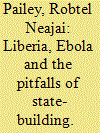

|
|
|
|
|
| Summary/Abstract |
Using the Ebola outbreak of 2014/2015 in Liberia as a case study, this article demonstrates that by converting ‘private activities and resources’ for public health service delivery, Liberian domestic and diasporic non-government actors effectively broadcasted public authority at meso- and micro-levels previously assumed to be the exclusive domain of government and international institutions. Moving beyond the structural violence and state-building frameworks, I argue that while Liberia's pursuit of a vertical state-building agenda at the behest of international donors unravelled during Ebola, the public health measures employed by non-government Liberian actors were constituted by horizontal nation-building objectives. This refashioned how we think about public authority in post-war states and beyond. The article provides a systematic documentation of how and why Liberians ‘inside’ and ‘outside’ the geographic territory of the post-war state used their individual and collective agency to eradicate Ebola, and why their interventions are important for a larger discussion about the trajectory of post-Ebola recovery. Though it is difficult to prove a causal relationship between the interventions of non-government Liberian actors and the gradual decline in Ebola incidence rates, I underscore important correlations between their public health measures and Ebola eradication.
|
|
|
|
|
|
|
|
|
|
|
|
|
|
|
|
| 16 |
ID:
190212


|
|
|
|
|
| Summary/Abstract |
Article VII of the Biological Weapons Convention (BWC) requires states to provide emergency assistance in the case of a deliberate bioweapons attack on any state party to the convention. Since no operational mechanism defining how to request or provide such assistance has yet been established, the painful lessons of the 2014–2016 West African Ebola crisis returned this topic to the agenda of the BWC. This study uses multiple streams analysis to investigate the impact of the Ebola crisis on the considerations of Article VII. While it revived the three streams of the debate—problem, policy, and politics—and opened a policy window, nevertheless, no political entrepreneur was able to couple the streams to produce policy output. As this window of opportunity begins to close, the Covid-19 pandemic seems to be the next focusing event shaping the BWC discourse on emergency assistance.
|
|
|
|
|
|
|
|
|
|
|
|
|
|
|
|
| 17 |
ID:
144248


|
|
|
|
|
| Summary/Abstract |
This article focuses on the use of Personal Protective Equipment in humanitarianism. It takes the recent Ebola outbreak as a case through which to explore the role of objects in saving individual lives and protecting populations. The argument underlines the importance of PPE in mediating between individual patient care and biosecurity. In addition it questions the preoccupation with technical fixes; challenges dominant perceptions about the subject of humanitarianism being the victims of disaster; traces the production of a particular politics of life; and explores the individualisation of risk and concomitant processes of labour discipline in the everyday lives of humanitarian workers.
|
|
|
|
|
|
|
|
|
|
|
|
|
|
|
|
| 18 |
ID:
140206
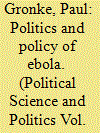

|
|
|
|
|
| Summary/Abstract |
It was a dark and stormy night in mid October in Boone, North Carolina. I was late for a gumbo dinner that my co-editor was hosting at his house in honor of a visit to the area by Barbara Walthall, the managing editor for PS. Wind gusts exceeding 50 mph were forecast, and rain was coming down in sheets. I wasn’t quite sure the mountainside wouldn’t wash down on me before I got to Phillip’s house. “Too bad for Barbara,” I thought, “she missed the fall colors by just one day.”
|
|
|
|
|
|
|
|
|
|
|
|
|
|
|
|
| 19 |
ID:
144243
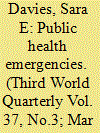

|
|
|
|
|
| Summary/Abstract |
The UN Security Council meeting on 18 September 2014 represented a major turning-point in the international response to the Ebola outbreak then underway in West Africa. However, in the light of widespread criticism over the tardiness of the international response, it can be argued that the UN, and particularly the Security Council, failed to make best use of a potential resource it already had on the ground in Liberia: the United Nations Mission in Liberia (UNMIL). This article examines whether UNMIL could have done more to contribute to the emergency response and attempts to draw some lessons from this experience for potential peacekeeper involvement in future public health emergencies. UNMIL could have done more than it did within the terms of its mandate, although it may well have been hampered by factors such as its own capacities, the views of Troop Contributing Countries and the approach taken by the Liberian government. This case can inform broader discussions over the provision of medical and other forms of humanitarian assistance by peacekeeping missions, such as the danger of politicising humanitarian aid and peacekeepers doing more harm than good. Finally, we warn that a reliance on peacekeepers to deliver health services during ‘normal’ times could foster a dangerous culture of dependency, hampering emergency responses if the need arises.
|
|
|
|
|
|
|
|
|
|
|
|
|
|
|
|
| 20 |
ID:
144247
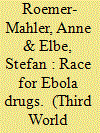

|
|
|
|
|
| Summary/Abstract |
The international Ebola response mirrors two broader trends in global health governance: (1) the framing of infectious disease outbreaks as a security threat; and (2) a tendency to respond by providing medicines and vaccines. This article identifies three mechanisms that interlink these trends. First, securitisation encourages technological policy responses. Second, it creates an exceptional political space in which pharmaceutical development can be freed from constraints. Third, it creates an institutional architecture that facilitates pharmaceutical policy responses. The ways in which the securitisation of health reinforces pharmaceutical policy strategies must, the article concludes, be included in ongoing efforts to evaluate them normatively and politically.
|
|
|
|
|
|
|
|
|
|
|
|
|
|
|
|
|
|
|
|
|